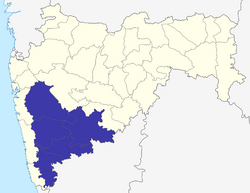قسم پونه
Paschim Maharashtra | |
|---|---|
| Pune Division | |
 Location of Pune Division in Maharashtra | |
| الإحداثيات: 18°31′48″N 73°50′24″E / 18.53000°N 73.84000°E | |
| Country | India |
| State | Maharashtra |
| Districts | 1. Pune، 2. Kolhapur، 3. Sangli، 4. Satara، 5. Solapur |
| الحكومة | |
| • Commissioner Pune Division | Dr. Chandrakant L. Pulkundwar (IAS) |
| • Police Commissioner Pune Division | NA |
| • All Guardian Minister Pune Division | (Solapur District) |
| • All District Collector's Pune Division |
|
| • All MP's Pune Division | NA |
| المساحة | |
| • الإجمالي | 58٬268 كم² (22٬497 ميل²) |
| • Under irrigation | 8٬896 كم² (3٬435 ميل²) |
| التعداد (2011 census) | |
| • الإجمالي | 23٬449٬049 |
| Literacy (2001 Census) | 76.95% |
| Main crops | Jowar, wheat, bajra, sugarcane, rice, soybean, onion, groundnut, vegetables, turmeric, grape, pomegranate |
Pune Division (better known as Paschim Maharashtra or Desh) is one of the six administrative divisions of the Indian State of Maharashtra. Pune Division is bound by Konkan Division to the west, Nashik Division to the north, Aurangabad Division to the east, and the state of Karnataka to the south.[1]
It includes some of the most developed and most populous areas of Maharashtra.
السكان
At the 2011 Census, Pune Division had a population of 23,449,049.[2] The region has a high literacy rate; higher than the national average. According to the 2011 Census, Pune district has a literacy rate of 86.15%, Satara 82.86%, Sangli 81.47%, Kolhapur 81.50% and Solapur 77.01%.
Languages
The most spoken language is Marathi, which is also the sole official language of the region. There are significant minorities of Hindi speakers as well as speakers of other regional languages such as Telugu, Kannada, Gujarati, Marwari and Bengali in the Urban areas. Kannada is also spoken by a large number of people in the regions bordering Karnataka. Urdu is spoken by the local Muslim population as well as migrants.
At the time of the 2011 Census of India, 81.90% of the population of Pune Division spoke Marathi, 6.88% Hindi, 3.30% Kannada, 2.33% Urdu, 0.97% Telugu, 0.71% Marwari and 0.65% Gujarati as their first language.[3]
Religion
At the time of the 2011 Census of India, 86.99% of the population of Pune Division followed Hinduism, 7.62% Islam, 2.49% Buddhism, 0.74% Christianity and the remaining 2.16% of the population followed other religions or stated no religion.[2]
Religion in Pune Division (2011)[2]
History of administrative districts in Pune Division
There have been changes in the names of districts and has seen also the addition of newer districts after India gained Independence in 1947 and also after the state of Maharashtra was formed.
- Notable events include the creation of Sangli district after merging former royal kingdoms of Miraj, Aundh, Sangli, Tasgaon, and Kurundwad.
- The Second event includes the renaming of the erstwhile Poona district as Pune district.
- The Solapur district is under proposal to be divided and a separate Pandharpur district be carved out of existing Solapur district, comprising talukas of Pandharpur, Sangola, Karmala, Mangalwedha, Malshiras and Madha in Solapur district and also talukas of Jath and Atpadi from neighbouring Sangli district, to create a new Pandharpur district.
- The Pune district is under the proposal to be divided and a separate Baramati district be carved out of existing Pune district with the inclusion of the eastern parts of Pune district which include Shirur, Purandar, Daund, Baramati and Indapur talukas as well as Phaltan taluka from neighboring Satara district in the proposed Baramati district.
- The Satara district is under the proposal to be divided and a separate Karad district be carved out of existing Satara district with the inclusion of Karad and Patan as well as talukas of Walwa, Kadegaon and Shirala from neighboring Sangli district in the proposed Karad district.
References
- ^ Rao; Prakash; Patil; Yogesh. Reconsidering the Impact of Climate Change on Global Water Supply, Use, and Management. IGI Global. p. 253. Retrieved 4 November 2016.
- ^ أ ب ت "Population By Religious Community". censusindia.gov.in. Retrieved 2023-09-12.
- ^ أ ب "Table C-16 Population by Mother Tongue: Maharashtra". censusindia.gov.in. Registrar General and Census Commissioner of India.